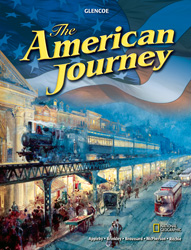
The American Journey © 2012Chapter 31: New ChallengesChapter OverviewsSection 1: The Reagan Presidency President Reagan promoted conservative policies, such as lowering taxes and reducing government rules on business. Reagan cut domestic programs, but increased military spending to fight against communism in Latin America and other parts of the world. With the economy booming, Reagan easily won a second term, although it was marred by the Iran-Contra scandal. Talks with the new Soviet leader Mikhail Gorbachev led to a nuclear arms treaty. Section 2: The Bush Presidency Significant global events occurred during George H. W. Bush’s presidency, including the collapse of the Soviet Union, and a serious crisis in the Middle East that led to the Persian Gulf War. At home, Bush was challenged by the costly Savings & Loan crisis, a large federal debt, and a slowing economy. He was able to update the Clean Air Act and improve the civil rights of people with disabilities. Section 3: A New Century President Clinton struggled with Republicans in Congress over the budget deficit, and their conservative Contract with America. Despite scandals and the threat of impeachment, Clinton achieved several major economic goals and social reforms. In foreign affairs, Clinton supported free trade, and hosted peace talks with both Middle Eastern and Yugoslav leaders. In the close 2000 presidential election, George W. Bush was eventually declared the winner. He appointed a diverse cabinet, and launched programs to cut taxes, reform education, and add new military programs. The nation enjoyed economic prosperity, but was deeply divided politically. Section 4: The War on Terror On September 11, 2001, the United States suffered the worst terrorist attack in history. As a result, the United States launched a massive effort to combat terrorism. In October, 2001 a U.S.-led coalition of international forces invaded Afghanistan to capture the people who planned the September 11 attacks. In 2003, President George W. bush authorized an invasion of Iraq. The Iraqi government was overthrown but fighting between Iraqi insurgents and the United States and its allies continued. In 2008, voters elected a Democratic president. Barack Obama is the first African American president and was elected with 53 percent of the popular vote and 365 electoral votes. The new president faced a very serious economic crisis and domestic issues, such as the reform of the health-care system. Ongoing wars in Afghanistan and Iraq were also a challenge he had to address. Section 5: Challenges Ahead The United States and other nations are part of an interdependent global economy. In 2008 a financial crisis hit the United States and the rest of the world. As part of the global economy, the United States imports and exports goods. The U.S. has a large trade deficit because it spends more on imports than it earns on exports. Globalism has led to awareness of the harm being caused to the environment. Scientists believe that global warming may lead to changing weather patterns. The U.S. population is changing in many ways. The population is made up of people who are living longer. By 2009, more than half of the nation's immigrants were coming from Latin America and Canada. Addressing illegal immigration is a challenge for the government. The government is also working to address public health issues such as a flu pandemic and reforming health care. |  |















